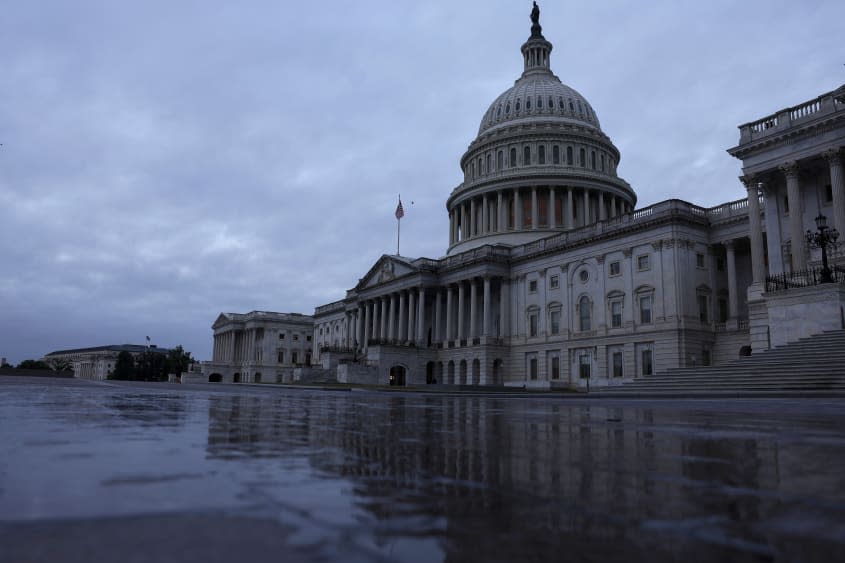Winners and losers of the debt ceiling deal

- Oops!Something went wrong.Please try again later.
- Oops!Something went wrong.Please try again later.
President Biden and House Speaker Kevin McCarthy (R-Calif.) reached a tentative deal on raising the nation's $31.4 trillion debt limit, giving Congress time to pass it before June 5, when the Treasury Department will start running short of money to cover all its obligations. If lawmakers approve it, the nation will avoid a catastrophic and unprecedented default.
The proposed agreement would lift the borrowing limit for two years, until after the 2024 election, and cap non-defense discretionary spending at $704 billion for fiscal 2024. That's more than House Republicans wanted; they had called for returning to the $689 billion spending level of 2022. But it's significantly below the previously projected 2024 baseline of $757 billion. The White House said the two-year deal, if it gets through Congress, would lower spending by about $1 trillion over 10 years. House Republicans estimate it would cut spending by $2.1 trillion if suggested budget caps were extended for another four years.
The tentative deal also would add work requirements for food stamps for adults 50 to 54 by 2025 but eliminate those requirements for veterans, homeless people, and young people leaving foster care. It also would redirect up to $20 billion from the $80 billion Biden and congressional Democrats allocated to the IRS last year to go after wealthy tax cheats, modernize aging technology, and improve customer service. Can one side claim victory, or would this be a win for all?
Republicans remained (mostly) united
This deal "is a significant victory" for Republicans, said The Wall Street Journal in an editorial. Veterans win, too, because the agreement provides a bigger share of the "discretionary pot" for their health care. The Pentagon also got a boost, because the "GOP resisted the Democratic demand for parity between defense and social-welfare spending," so defense spending will increase by about 3% in fiscal 2024 and rise again the next year. And Republicans advanced their priorities "in return for raising the debt ceiling that had to be raised anyway." This plan isn't perfect, and it faced last-minute opposition from a handful of hard-line conservatives, but so much for "the Democratic narrative that Republicans can't govern."
And taxpayers come out on top
Taxpayers also scored some wins, said the Boston Herald in an editorial. To Biden and his fellow Democrats, "taxpayers are ATMs," and this administration's "trillion-dollar-plus spending spree helped fuel inflation," while threatening "budget issues down the line as the bills come due." Republicans didn't stop as much of this spending as they wished, but they "did manage to swerve around one big fiscal pothole: student loan payments." The deal ends Biden's student-loan payment pause this summer, saving American taxpayers $5 billion a month. Another element that is "particularly vexing to progressives" but good for the nation's finances is that, provided Congress approves the deal, "food and health care programs would now come with work requirements." The plan makes "some inroads in treating taxpayers as more than just walking wallets."
Biden blocked the GOP's 'outrageous' demands
"It's hard to conceive of an outcome more favorable to Biden," said Jennifer Rubin in The Washington Post. Remember, when this showdown started the Republican House Freedom Caucus was threatening to let the government default on its debts unless it got the president to cave on "repealing much of the Inflation Reduction Act (including eliminating $80 billion in new funds for the Internal Revenue Service), capping nondefense spending at fiscal 2022 levels for a decade and blocking Biden's $400 billion proposed student debt relief. None of that happened." Instead, Biden blocked the GOP's "outrageous demands, kept his spending agenda and tax increases intact and got his two-year debt limit increase," all while stoking dissension "on the GOP side as the extreme MAGA wing denounces the agreement."
But McCarthy got away with 'one-sided bargaining'
The deal is a setback for anyone who believes in "fiscal discipline," said The New York Times in an editorial, thanks to the "one-sided bargaining" that allowed McCarthy to refuse "to truly entertain any of the Democrats' proposals to raise revenue." The deal didn't touch the 2017 Trump tax cuts, "which added $1.8 trillion to the deficit through 2029 for the benefit of corporations and the wealthy." It also left in place the "carried-interest loophole, which benefits hedge-fund managers and private equity funds," and allowed the Pentagon to grow while "shortchanging many important investments in education, housing, infrastructure and disease prevention." "A much more responsible form of fiscal discipline is to collect the taxes that are owed, to make considered spending cuts where appropriate and to reverse tax cuts that solely benefit the wealthy."
You may also like
Air New Zealand to weigh international passengers as part of safety survey
Thousands flock to Missouri to see body of nun who died in 2019

